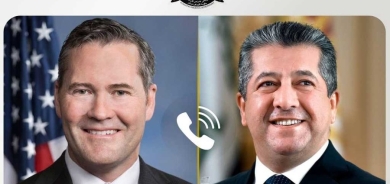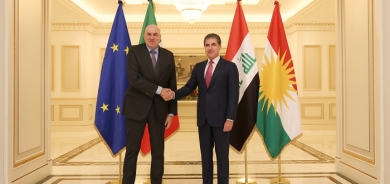Robert A. Dahl to Gulan Magazine:One can establish democratic forms and maintaining them to the times of crises, which is critical and difficult, because every country experiences crises that
February 8, 2012
Exclusive Interviews

Robert A. Dahl, Sterling Professor Emeritus of Political Science and Sr. Research Scientist Sociology, is a member of the National Academy of Sciences, the American Philosophical Society and the American Academy of Arts and Sciences, a corresponding member of the British Academy, and a past President of the American Political Science Association. His publications include Congress and Foreign Policy; Politics, Economics and Welfare (with C. E. Lindblom); A Preface to Democratic Theory; Who Governs? Democracy and Power in an American City; After the Revolution?; Polyarchy; Size and Democracy (with E. R. Tufte); Dilemmas of Pluralist Democracy; A Preface to Economic Democracy; Controlling Nuclear Weapons: Democracy Versus Guardianship; Democracy and Its Critics; Toward Democracy: A Journey; On Democracy; How Democratic is the American Constitution?, Politica e virtu', La teoria democratica de nuovo secolo, After the Goldrush: Growing up in Skagway and On Political Equality.We contacted the Professor Dahl few years ago in order to take his opinions and views about democracy, post-dictatorship democracies, and multi-party system. The Professor Dahl replied to our questions in an exclusive interview to Gulan Magazine as the following:
* There are two types of systems in the democratic system; Multi-Party System and Two-Party System. In your view; what are the differences between these two types in a democratic government?
- The electoral system that produces the Two-Parties System is typically a single-member district system; one that revelry produces a multi-party system a proportion representation system. The basic difference between the two; the single-member district winner take all means of the members of the legislating body divided up into districts representatives of the lower house where they elected, and they elected on the bases of the person with the largest number of votes, even if it is less than the majority, takes the office such called, that’s where the winner go. Most of the countries in the middle of the nineteen century adopted a proportion representation system, which means that they are likely to have multi parties in the legislated body, and the parliamentary system is means that the cabinet is likely to be composed of more than a single party usually. Often several parties sometimes, as in places like the Netherlands where it will be have sometimes four five to six parties.
* In your view; why the two-party system is better than the multi-party system? What are the reasons regarding to democracy, stabilization and security?
- I don’t really know that it can be said that they are better, the reason of that I doubt about that is that there is very stable democratic countries, and I am thinking now of the Scandinavian countries, and also Holland, they are highly stable in character and their progress, they have been enduring for a long time, and they managed to reach compromise among the parties. I think however to achieve that it takes a particular political culture inherited in their history and in their political experience, that facilitate compromise among the various disagreed factions and in the population. So; I wouldn’t say that the two-party system is more stable, but it is also true of course that it has have been in countries where the multi-party system, and I thinking here of Italy as very higher levels of internal in cabinets.
* In Iraq and after Saddam Hussein has gone, do you believe that democracy can be established? If not; what you think the obstacles are?
- I think one obstacle over the longer run to establishing and maintaining democracy – and I want to insist on the word “Maintaining” – it is that; one can establish the democratic forms and maintaining them to the times of crises, which is critical and difficult, and I say that because every country experiences crises, that put a great stress and strains on the political system, and the importance would be to have a system that is stable enough in order to get through that, and that stability depends great heavily on the political culture, a political culture in which the norms of constitutional government and democracy are firmly established that these crises will not result in the destruction of the government, and here compared for example with the Great Depression and the newly established democracy in Germany which had a very weak and was not as strong as it was elsewhere. In the United States and the Scandinavian countries, they survive these crises; not simply because of the political institutions established vey greatly compared among the different countries, but also because of the deeply political culture supporting the idea of popular democratic control over the government.
* Those political parties that compose a coalition government together, all of them are responsible for either the success or the failure of the government, but sometimes; some parties within the coalition government turn to become opposition. What are your views in this regard?
- I don’t see any fundamental objection to a political party that no longer feels that it is adequately represent the interests of its constituents or radically represented by the coalition from withdrawing. On the other hand; I think the withdrawal in order to bring down a government is a very serious step to undertake, at least one would hope that it is not taken likely or simply narrow partisan view, bringing down a government causing an interruption of the government and to do new elections in countries that have electoral system of that kind, that’s a very serious step and often can be seeing as a local political crisis.
* There are two important factors for democracy building process; the first factor is the rule of law, and the second one is the middle class. But these two factors don’t exist in Iraq. In your view; how is it possible to build these two factors in Iraq? Meantime; the ruling religious parties, such as he Shiite group, what do you think the risks are of the religious parties upon democracy?
- I think that the religious parties – depending upon the way in which they hold their religious belief – the religious parties can be a great danger to democracy if they are seeing to have a view that they exclusively hold the truth and that they exclusively should be in charge over the government, and those who do not share their views are necessarily dangerous and so on. That’s not necessarily true of the religious parties; modern Christian democratic parties have managed to assimilate themselves in many countries as in Germany and etc… accepting the fact that they are simply won the perspective on others within a legitimate system.
* When elections do not intend to build democratic and secular institutions in the government, then what will be the use of these elections? Don’t you think that this process is in vain?
- Often; in weakly democratic and non-democratic countries; the elections are simply means, by which the government attempts to reach to build legitimacy, and I think often the have been succeeding in doing so. But it is a kind of false legitimacy based upon fake veneer of the democratic institutions, and it simply manipulated by the ruling elites.
* In your view; how the multi-party system can be organized in democracy? Do you think that every political ideology, such as the religious political parties, can they produce democracy?
- Yes. They may not but they can. I think – here again – that the Christian democratic parties of Europe have by enlarge been supportive of democracy, they come because of their constituents, and they strength the democratic culture. I can’t overemphasize that the – I emphasized already many times – but; if there is a culture of foundation, that is where people develop habits and their beliefs that passed to them from one generation to another – and not simply fragile institutions – then they can survive. And if they have habits of cooperation, conciliation, and compromise then they can survive, sometimes it seems to be well in the multi-party system. Here again I am thinking of some European countries, the stable ones like the Netherlands for example; which have a very stable political system, and as we know it is as a very productive economic country in the international level and in the local level.
* It is a fact that the political ideology can produce democracy, in particular the Christianity ideology. But here we are specifying the Islamic ideology in the Middle East. In your view; why do you think that they fail in producing democracy?
- Again, if I may refer to the western notion; play those notions by of the philosophers who have the exclusive grasp from what the truth is and what’s more have from their point of views have, and what the ordinary people don’t. They have the quality of virtue and the commitment to the public good, but it is lacking in the memoirs of the general public. Now; that’s a persuasive view and it is wondered to self-serving among the political elites, because to the political elites they can exploit that kind of view to achieve their own power. And if I may again, according to an ancient saying; when they get into power, I think that it is logically true – whether in a state or business organization or elsewhere – that absolute power does be corrupted, or even having a very high degree of power. What does that mean when you say that? It means that it becomes more and more difficult for those in power to accept criticism and to search for alternative points of view, begins of producing elite which is so confident of its own point of view and often develops an ideology that supports that, that they are no longer available to listen to criticism or alternative points of view. And that’s turned-out generally to be destructive, and they see themselves – if they do from destruction – only by imposing a highly authoritarian rule.
* Professor; we follow your writings and we know that you call democracy as “Minorities Rule”, and whenever you criticize democracy, you are criticizing the Greek democracy. Let’s assume that you intend to criticize the democracy of Iraq or the Middle East, in particular when the Islamic parties in power, what will you say?
- I use that term because a majority is rarely a single homogeneous group, a majority typically consists of a coalition of minorities. The danger always is that if parties gain power in a situation where the democratic institutions and the democratic culture are relatively weak, deeply imbedded in the cultural and the traditional culture framework; then they has the confidence that they have the truth and they know what is best. Then the intendancy not only to believe they know best, but then to act in a way that would act on that belief and destroy as much as they can anybody who disagrees with them on that, including all political oppositions.
* Last Question: whenever we talk about Iraq, we see that the political parties use people’s suffering and endurance as a mean to obtain their own political ambitions, and after they gain their own interests; people’s suffering becomes history. Is it the same phenomena elsewhere?
- No, I think what happens in well-established democratic countries is that; if people begin suffering in sufficient numbers, then they turnout to peaceful elections, they turnout their rulers, they turnout the political parties and their officials who are in power, and supports those who promise change. Change is what always come about then it turnout to be stable, but sometimes enormous changes take place, and I am thinking here of the social democratic labor party of Europe and England, and think for example of change in the United States during Franklin Roosevelt’s in about one century ago, where the structures of capitalism that had helped to bring about the collapse and a great deal of suffering then undergo change, and we begin to get – for example long time ago now – we begin to get the introduction of welfare states which help to protect people from the harshness of market capitalism. I think that market capitalism is the only system with more or less competitive markets. It is the only system that is compatible with the democratic order, because it is the only system we know that is sufficiently decentralized. So; in the market system – more or less competitive market system – is; with all of its evils, I think is essential to a democratic country.
Transcription by: Qane’ Kakeiy















